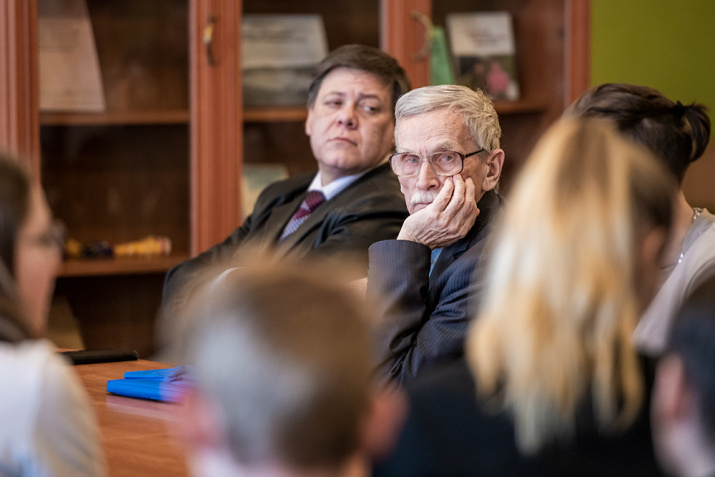On April 8, the Murmansk Regional Scientific Library hosted a presentation of the Report of the Complex Expedition of the Russian Geographical Society and the Northern Fleet "Remember the War". The head of the Department of the Hydrographic Service of the Northern Fleet, Captain 1st rank Alexey Kornis spoke about the second stage of the expedition and shared plans for the third one. The participants of the event had a chance to see the national award Crystal Compass.
The event opened with a welcome speech by Denis Moiseev. He spoke about the prestigious national award Crystal Compass, which is also called the “geographical Oscar".
“This is a very prestigious award, the number of applications increases every year, so it is a great honor to win it for the second time. We will strive to continue working on new projects,” he stressed.
“This award was a pleasant surprise for us, because in the entire history of the Geographical Oscar, there were only two cases when the same organization received the award twice. The second time it is much more difficult to get it than the first time. Our work was highly appraised, and we are very happy about that,” said Alexey Kornis, scientific director of the Expedition.
During the event, the scientific director of the Expedition, Captain 1st Rank Alexey Kornis, spoke about the course of the second season of the Complex Expedition, its discoveries, successes and plans for this year.
The main purpose of such expeditions is to add flavour to the daily work of the fleet to protect the Arctic borders, to make this work more interesting, to expand opportunities for understanding what the servicemen of the Northern Fleet are needed for, to conduct scientific geographical and historical research, to pay tribute to the heroes of the Great Patriotic War. The search for sunken objects is carried out mainly with the help of hydroacoustic tools that allow to identify objects located on the bottom.
The stages of the second season of the expedition took place in the Kola Bay and approaches to it, Zapadnaya Litsa, White Sea Throat, the Rybachy Peninsula, the Novaya Zemlya archipelago and Teriberka. All of them were connected with various historical events during the Great Patriotic War.
Following the results of the second season, 21 vessels were found, the coordinates of six vessels were specified, eight more were removed from the maps. In total, 11 vessels and 370 people were involved in the search activities.
In two seasons, 37 ships, vessels, boats, two planes, three mines were discovered, and a unique M3 Lee tank was raised from the bottom of the sea.
“There were no such expeditions in our country during the entire post-war period, this is a matter of great pride for us,” Alexey Kornis stressed.
After the presentation, Alexey Kornis answered numerous questions from the audience, the author of the best question received a copy of the Report on the second season of the Expedition. Also, copies of a rare edition with a circulation of only 70 copies were presented to the Murmansk Regional Scientific Library and the Murmansk Regional Branch of the Russian Geographical Society. At the end of the event, everyone could take a picture with the Crystal Compass.
The Murmansk Regional Branch of the Russian Geographical Society expresses its gratitude to the Murmansk Regional Scientific Library and personally to Elena Mikhailova for the opportunity to hold this event and the comprehensive assistance provided in its organization.






